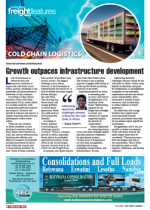Re searchers from the Columbia Climate School have identified the steps and technology of the cold chain which increase the carbon footprint of fresh produce.Benjamin Ritter, Carolyne Barker and Kevin Karl say “refrigerators, industrial chillers, and transportation have significant potential impacts on climate change, from massive energy demands to powerful f luorinated greenhouse gas emissions”.They estimate that global food system refrigeration is responsible for up to 5% of global energy needs and 2.5% of total greenhouse gas emissions.“Rising global temperatures and emerging economies will continue to drive demand for massive new cold chain infrastructures,” they predict.More efficient global cold chains are needed to reduce the approximately 144 million tons of annual food loss in developing countries alone.Globally, food loss and waste account for nearly 4.4 gigatons of carbon dioxide emissions a year.Reducing waste comes with an emissions trade-off – air chillers, refrigerated trucks, reefers and cold stores all consume energy which, if supplied through the burning of fossil fuels, adds to the carbon footprint of fresh produce.In addition, f luorinated gases (F-gases) used as refrigerants are leaked into the atmosphere.They are up to 25 000 times more damaging as greenhouse gases than the equivalent carbon emissions.Global food cold chain energy consumption and F-gas emissions are responsible for about 3.5% of the world’s carbon footprint, they estimate.The Africa Centre of Excellence for Sustainable Cooling and Cold-Chain (Aces) is one of the organisations tackling the challenge.Aces plans to commission Africa’s first environment test chamber in Rwanda by the end of 2024.It will enable the testing and certification of equipment tailored to African needs, according to Professor Toby Peters, director, Centre for Sustainable Cooling University of Birmingham and Heriot-Watt University.“Simultaneously, in Kenya, we will launch the community outreach programmes in spring 2024, including allowing farmers to trial technology before making investments. “All of these will be underpinned with a strong cohort of trained trainers and technicians,” he writes in the March 2024 Aces Review.“With the world’s first cold-chain and cooling institute, with its own campus and outreach SPOKEs being established in Africa, we now have the frontline capability to accelerate a resilient, sustainable, and inclusive transformation on a systemic level,” he writes.SPOKEs (specialised outreach and knowledge establishments) will share research, innovation and knowledge in different markets through a hub and spoke model.Funding is being provided by the UK government.

